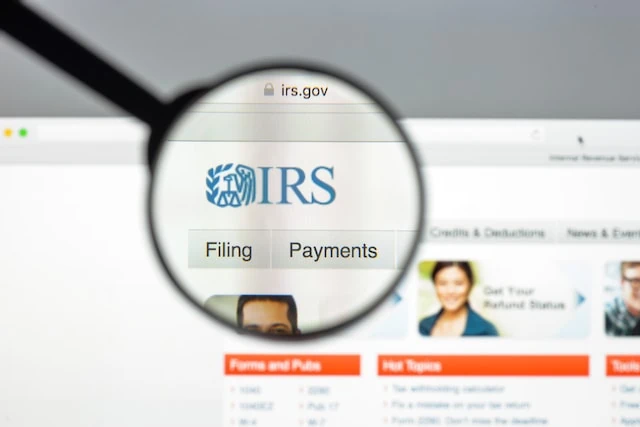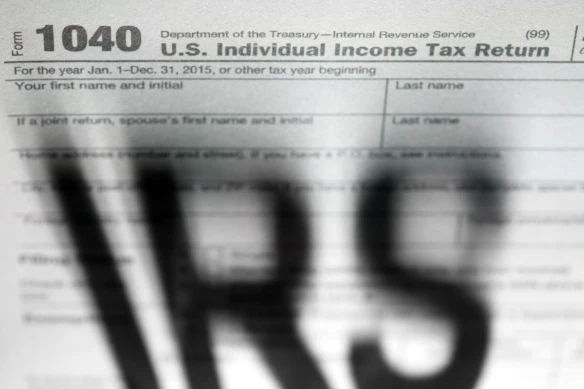The annual tax filing season is almost upon us. The IRS will start accepting federal income tax returns on Jan. 29, and then the country will be obsessed with taxes for the following 2½ months.
For some unlucky souls, tax season also means having to deal with the IRS. And let’s face it … despite recent progress, the tax agency doesn’t exactly have a great reputation when it comes to efficiency, clarity, or helpfulness (especially over the past couple of years). In many cases, you’re better off avoiding direct contact with the IRS if at all possible.
Nevertheless, whether we like it or not, we’re all impacted by IRS operations. So, we ought to prepare ourselves for some of the problems we might face this year. And to help us with that, Erin Collins, head of the Taxpayer Advocate Service, has provided a list of the most serious IRS problems encountered by taxpayers.
Read on to see the worst IRS problems taxpayers will face this year. With any luck, the items on Collins’ list won’t be a big problem for you … but you never know.
Table of Contents
1. Processing Delays

According to Collins’ report, one of the most important IRS problems facing taxpayers is the delay in processing tax returns, responding to letters and other correspondence, and sending tax refunds. For example, the IRS had a backlog of over 6 million pieces of correspondence and amended tax returns in October 2023.
This, of course, is extremely frustrating for taxpayers who are waiting for the IRS to act. They’re trying to comply with their tax obligations and fix tax issues, but can’t do so until the IRS does its job.
However, IRS delays also cost the government a lot of money. According to the report, $1.4 billion in additional interest payments were made last year to taxpayers who filed an amended return or were due a tax refund. Without the IRS delays, this cost could have been avoided.
2. Understaffing

The IRS doesn’t have enough trained personnel to do its job properly … and the problem could get worse.
According to Collins, IRS staffing levels have dropped dramatically over the past decade. Not only does insufficient staffing cause a decline in the quality of IRS customer service, but it also contributes to the processing delays mentioned earlier.
It apparently takes the IRS 134 days, on average, to hire someone. It takes an average of 193 days for external hires where no direct hiring authority exists. Thanks to the cumbersome hiring process, the IRS is likely losing a lot of qualified candidates who apply for jobs at the tax agency.
Training is also an issue. Given the complexity of the tax code and tax administration, many IRS employees must go through a lengthy training process, which further extends the time it takes to get new employees up and running.
There’s bad news for the future, too. Although the IRS hired 30,742 employees in 2023, 18% of its current workforce is eligible for retirement. The IRS also estimates that 37% of its employees will actually retire in the next five years.
3. Providing or Sharing Information

Collins’ report points out a “lack of effective two-way communication between the IRS and the taxpayers who have to interact with it.” For taxpayers, this can create confusion, mistrust, and frustration with the tax system. For example, the report slams the IRS for taxpayer difficulty in:
- Finding clear and timely guidance
- Determining the status of pending issues
- Understanding IRS correspondence
- Reaching an IRS employee with the knowledge to answer questions and the authority to resolve problems.
Collins warns that this lack of reliable information can lead to both taxpayer skepticism and a reduced level of voluntary compliance with the tax law.
Furthermore, the report notes that the IRS has overly hyped its recent modernization efforts in ways that often leads to unrealistic expectations. Instead, the IRS should provide “full and candid information about the state of its operations, not just pick and choose the data that makes the agency look best.”
Related: IRS Erases $1 Billion In Back Tax Penalties
4. Telephone and In-Person Service

While it has improved of late, customer service is still a big problem for the IRS. When they need help with tax issues, taxpayers primarily connect with the IRS through two service channels: telephone helplines and Taxpayer Assistance Centers (TACs).
In 2023, live customer service representatives only answered 29% of the total number of calls to the IRS. Another 18% were answered with “automated responses.” Shockingly, the IRS didn’t even answer or the caller hung up for the remaining calls—that means 53% of all callers didn’t talk to an IRS representative!
Plus, the IRS’s phone service data doesn’t provide information about the quality of service taxpayers receive. For example, it says nothing about how many callers were transferred to someone else, how many times taxpayers had to call, or whether callers ultimately received the information they needed.
Things weren’t much better when it came to the TACs. The IRS only answered 34% of the calls from people who wanted to set up an appointment at a TAC. Plus, some states have only one TAC, which makes it difficult for taxpayers who live far away. Many TACs are understaffed or have limited hours, which can make it difficult for taxpayers to find an appointment time.
5. Tax Return Preparer Oversight

If someone is preparing your tax return for you, it’s important that he or she be competent, reliable, and honest. You might think that the IRS is responsible for making sure all tax preparers fit that bill … but you’d be wrong.
The tax preparer industry is largely unregulated. IRS data shows that almost 60% of 2022 tax returns filed by a paid tax preparer were completed by a non-credentialed preparer. While you shouldn’t automatically assume that a non-credentialed tax preparer is incompetent or dishonest, they generally aren’t subject to minimum standards or ethical codes.
As a result, Collins believes the absence of IRS oversight over the tax preparer industry “exposes taxpayers to a greater risk of incompetent or unethical actions.” And she might be right. For example, IRS data shows that non-credentialed preparers filed about 79% of prepared tax returns claiming the earned income tax credit (EITC) for the 2022 tax year. Those returns accounted for 91% of EITC-related audits and generated 94% of EITC-related audit adjustments.
To be fair, this isn’t a problem that the IRS can solve on its own. The tax agency doesn’t have the legal authority to regulate all tax preparers. That’s something Congress would have to authorize through legislation.
6. Identity Theft

Identity theft is a big problem nationwide. However, when it comes to tax-related identity theft, the IRS could do a better job of preventing it and resolving it.
As one example regarding prevention, Collins’ report notes that taxpayers only receive one letter asking them to authenticate their identity when the IRS suspects an identity thief may have filed a tax return. This leads to low taxpayer response rates, which makes it harder to prevent fraudulent returns.
The IRS could also do more to promote the use of Identity Protection Personal Identification Numbers (IP PINs), which are special identification numbers taxpayers can use when they file their federal tax return. In addition, some taxpayers have to wait more than four months to receive a requested IP PIN.
Another problem for taxpayers is that the IRS’s identity theft detection systems flags legitimate tax returns at a higher-than-desired rate. As a result, taxpayers who filed a proper return often have to wait to get their tax refund.
In addition, many victims of tax-related Identity theft in 2023 had to wait nearly 19 months before their tax returns and refunds were processed. Approximately 69% of these people were considered low-income taxpayers for which a refund delay could have caused significant financial hardship.
7. Insufficient Online Accounts

According to Collins’ report, some of the issues listed earlier could be improved or resolved if taxpayers had greater access to online information and services. For example, if taxpayers had the option to use a self-help website to answer questions or resolve issues, the IRS phone lines would have shorter wait times.
One thing that would help is to expand the functionality and capabilities of individual online accounts. Right now, taxpayers who have set up their own online account with the IRS can view basic account information, make payments, enter into payment plans, and view and download certain notices. However, suggested improvements include the ability to:
- Track submissions through the entire lifecycle of a tax return
- Submit offers in compromise online
- Chat with a revenue officer
- Calculate payoffs for any balances due
Collins also criticizes the IRS for failing to adequately promote awareness of online accounts. Did you even know they existed? Probably not. Recent data shows that only 11% of taxpayers who filed a 2022 tax return accessed an online account.
8. International Information Return Penalties

There are a number of IRS-imposed reporting requirements for people who receive money from another country or who have certain foreign financial interests. Steep penalties are often levied when a filing is late, incomplete, or inaccurate. According to Collins, “the majority of these penalties are automatically assessed, broadly applied, needlessly harsh, and often unexpected.” This can be particularly troublesome for lower-income taxpayers and immigrants who aren’t familiar or aware of the international information return requirements.
The IRS did not create the penalties. Congress created them to discourage taxpayers from hiding overseas income and assets. However, the IRS has discretion in how the rules are implemented. But in Collins’ eye, “the IRS has opted to flex its administrative muscle and bring down the enforcement hammer on good-faith taxpayers and bad actors alike” instead of promoting compliance with the rules through “taxpayer education and support.”
Specifically, Collins is concerned that the penalties are:
- Systematically assessed, without any prior review or opportunity to establish reasonable cause or other defenses
- Often erroneously classified as assessable and, therefore, must be paid before judicial review, which deprives taxpayers of review in the U.S. Tax Court and causes financial hardship
- Disproportionate in comparison with any potential underlying tax and fall particularly hard on lower-income taxpayers and small businesses
9. Compliance Challenges for Taxpayers Abroad

About 9 million U.S. citizens live abroad. Although they live in another country, they still have to pay U.S. taxes. Plus, in addition to the normal complexities of the tax code, they also face tax filing requirements that other people don’t have to worry about.
Unfortunately, though, Collins believes the IRS doesn’t do enough to help these taxpayers with the additional compliance requirements. Her report claims the IRS “offers limited assistance and guidance” and that “taxpayers often lack accessible, real-time customer service assistance from the IRS.” This can lead to taxpayer frustration and non-compliance.
Among other things, Collins’ report points out that taxpayers living abroad often lack access to affordable and qualified tax return preparers. There’s also a general lack of free tax return preparation assistance for them.
Obtaining help from the IRS can be a problem, too. In-person help is non-existent, since there are no Taxpayer Assistance Centers outside the U.S. and Puerto Rico. It’s also difficult for taxpayers living abroad to access online IRS systems if they don’t have a U.S. phone number, mailing address, or Social Security number.
Similarly, taxpayers living abroad have a hard time paying taxes or receiving refunds, since the IRS can’t accept electronic payments from foreign bank accounts.
10. Appealing IRS Decisions

If you disagree with an IRS determination about your tax liability, you can appeal the decision to … the IRS. The first line of appeal is with the IRS Office of Appeals. You can go straight to court if you want, but that can cost big bucks. So, an administrative appeal is often the way to go.
However, many taxpayers feel that the Office of Appeals is not sufficiently independent from the rest of the IRS. Whether or not that’s true, this perception can undermine trust in the system. Not only does this lead to more litigation—which is time consuming and costly for both sides—Collins points out that it can “compromise the taxpayer’s statutory right to appeal an IRS decision in an independent forum.”
While Collins goes out of her way to state that the IRS Office of Appeals is dedicated to the twin principals of independence and operational efficiency, she has the following concerns about the office’s current operations and structure:
- Not all Appeals decisions are autonomous and transparent
- The perception exists that IRS Chief Counsel attorneys attend Office of Appeals conferences to develop issues for trial
- Proposed regulations limit the Office of Appeals’ independence
- Taxpayers experience significant delays scheduling in-person conferences with the Office of Appeals
- A “compliance culture” lives within the Office of Appeals
- Alternative dispute resolution programs aren’t being used to their full potential
- Additional work is needed to ensure the Office of Appeal’s independence
Related:






![Child Tax Credit FAQs [What Every Parent Needs to Know] 23 child tax credit parents kissing baby](https://wealthup.com/wp-content/uploads/child-tax-credit-parents-kissing-baby-600x403.webp)

